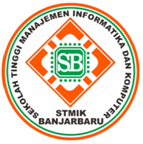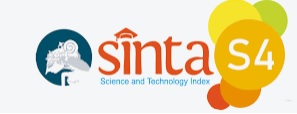Analisis Sentimen Terhadap Layanan Aplikasi Jenius di Media Sosial Menggunakan Alogritma Long Short-Term Memory
Abstract
The Jenius application was launched in 2015 by PT Bank BTPN Tbk, introducing innovation in digital banking services with an active presence on social media platforms like YouTube, Twitter (X), and Instagram. Users often provide reviews that can influence the perception and reputation of the application. This study aims to assist Bank BTPN in enhancing its services by analyzing positive, neutral, and negative user reviews. The method used is the Long Short-Term Memory (LSTM) model for sentiment analysis. The data analyzed consists of 856 comments on YouTube with the keyword "Jenius Application." The LSTM model was implemented to identify general perceptions and aspects that affect user satisfaction, using a data training and testing proportion of 70:30. The study results show that the LSTM model achieved an accuracy of 93.57% on the test dataset, demonstrating the model's effectiveness in identifying user sentiments, thus serving as a tool to improve the quality of Jenius application's services.
Keywords: Sentiment Analysis; YouTube; Long Short-Term Memory; Jenius App
Â
Abstrak
Aplikasi Jenius diluncurkan pada tahun 2015 oleh PT Bank BTPN Tbk, menghadirkan inovasi dalam layanan perbankan digital dengan kehadiran aktif di media sosial seperti YouTube, Twitter (X), dan Instagram. Pengguna sering memberikan ulasan yang dapat mempengaruhi persepsi dan reputasi aplikasi tersebut. Penelitian ini bertujuan untuk membantu Bank BTPN meningkatkan layanan dengan menganalisis ulasan positif, netral, dan negatif dari pengguna. Metode yang digunakan adalah model Long Short-Term Memory (LSTM) untuk analisis sentimen. Data yang dianalisis terdiri dari 856 komentar di YouTube dengan kata kunci "Aplikasi Jenius." Model LSTM diimplementasikan untuk mengidentifikasi persepsi umum dan aspek-aspek yang mempengaruhi kepuasan pengguna, dengan parameter proporsi data latih dan data uji sebesar 70:30. Hasil penelitian menunjukkan bahwa model LSTM mencapai akurasi sebesar 93.57% pada dataset uji, menunjukkan efektivitas model dalam mengidentifikasi sentimen pengguna sehingga dapat digunakan sebagai alat untuk meningkatkan kualitas layanan aplikasi Jenius.
Kata kunci: Analisis Sentimen; YouTube; Long Short-Term Memory; Aplikasi Jenius
References
J. Shobana & M. Murali, “Complex & Intelligent Systems,†An Effic. Sentim. Anal. Methodol. based long short-term Mem. networks, vol. Volume 7, p. pages 2485–2501, 2021, doi: https://doi.org/10.1007/s40747-021-00436-4.
M. A. Nurrohmat and A. SN, “Sentiment Analysis of Novel Review Using Long Short-Term Memory Method,†IJCCS (Indonesian J. Comput. Cybern. Syst., vol. 13, no. 3, p. 209, 2019, doi: 10.22146/ijccs.41236.
S. Hochreiter and J. Schmidhuber, “Long Short-Term Memory,†Neural Comput., vol. 9, no. 8, pp. 1735–1780, 1997, doi: 10.1162/neco.1997.9.8.1735.
K. Gopalakrishnan and F. M. Salem, “Sentiment Analysis Using Simplified Long Short-Term Memory Recurrent Neural Networks,†arXiv, pp. 1–6, 2020.
A.K. Sinha, “Bank Complaint Analysis Using Deep Learning LSTM.†[Online]. Available: https://github.com/Akashsinha1999/Bank-Complaint-Analysis-using-LSTM-Deep-Learning-Algorithm
A.M. Ozbayoglu, M.U. Gudelek, & O.B. Sezer, "Deep learning for financial applications: A survey. Applied soft computing, 93, 106384,2020.
X. Li, H. Xie, L. Chen, J. Wang, and X. Deng, “Knowledge-Based Systems News impact on stock price return via sentiment analysis,†vol. 69, pp. 14–23, 2014.
A. Ray and A. Chakrabat, “A combined approach of the Rule-based and Deep Learning method for aspect level sentiment analysis.†[Online]. Available: https://link.springer.com/content/pdf/10.1007/s40747-021-00436-4.pdf
S.I. Muhamad, “Sentimen Analisis Pada Media Sosial Menggunakan Metode Naive Bayes Classifier (Nbc),†Teknologipintar.org, vol. 3, no. 2, pp. 1-9, 2023.
G. Y. Lee, L. Alzamil, B. Doskenov, and A. Termehchy, “Model Performance,†pp. 1–6, 2021.
C. A. Misrun, F. Sains, D. A. N. Teknologi, U. Islam, N. Sultan, and S. Kasim, “Terhadap Anies Baswedan Sebagai Bakal Calon Presiden 2024 Menggunakan Metode Naive Bayes Classifier,†Repository, uin-suska, 2024.
D. Jurafsky and J. H. Martin, “Summary of Contents,†New York: Cambridge university press, 2023.
R. Slamet, W. Gata, A. Novtariany, K. Hilyati, and F. A. Jariyah, “Analisis Sentimen Twitter Terhadap Penggunaan Artis Korea Selatan Sebagai Brand Ambassador Produk Kecantikan Lokal,†INTECOMS J. Inf. Technol. Comput. Sci., vol. 5, no. 1, pp. 145–153, 2022, doi: 10.31539/intecoms.v5i1.3933.
H. H. S. Gunawan, I. N. Saniyah, “Improving the accuracy of text classification using Stemming method, a case of non-formal Indonesian conversation,†J. Big Data, vol. 8, no. 1, pp. 1–20, 2021.
S. Chanda & P. Sukomal “The Effect of Stopword Removal on Information Retrieval for Code-Mixed Data Obtained Via Social Media,†SN Comput. Sci., vol. Volume 4, no. 3, pp. 113-124, 2023, doi: https://doi.org/10.1007/s42979-023-01942-7.
T.B. Sianturi, I. Cholissodin, & N. Yudistira, "Penerapan Algoritma Long Short-Term Memory (LSTM) berbasis Multi Fungsi Aktivasi Terbobot dalam Prediksi Harga Ethereum. Jurnal Pengembangan Teknologi Informasi dan Ilmu Komputer, vo;. 7, no. 3, pp. 1101-1107, 2023.
A. E. Augustia, R. Taufan, Y. Alkhalifi, and W. Gata, “Analisis Sentimen Omnibus Law Pada Twitter Dengan Algoritma Klasifikasi Berbasis Particle Swarm Optimization,†vol. 23, no. 2, pp. 59-68, 2021.
K. S. Nugroho et al., “Deteksi Depresi Dan Kecemasan Pengguna Twitter,†Ciastech, pp. 287–296, 2021.
How To Cite This :
Refbacks
- There are currently no refbacks.










